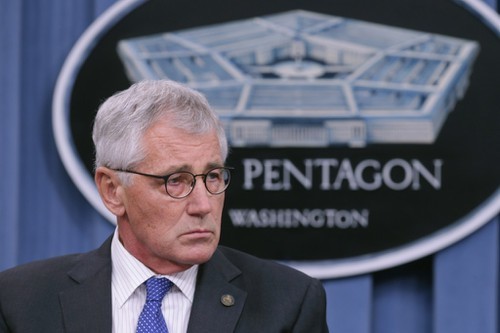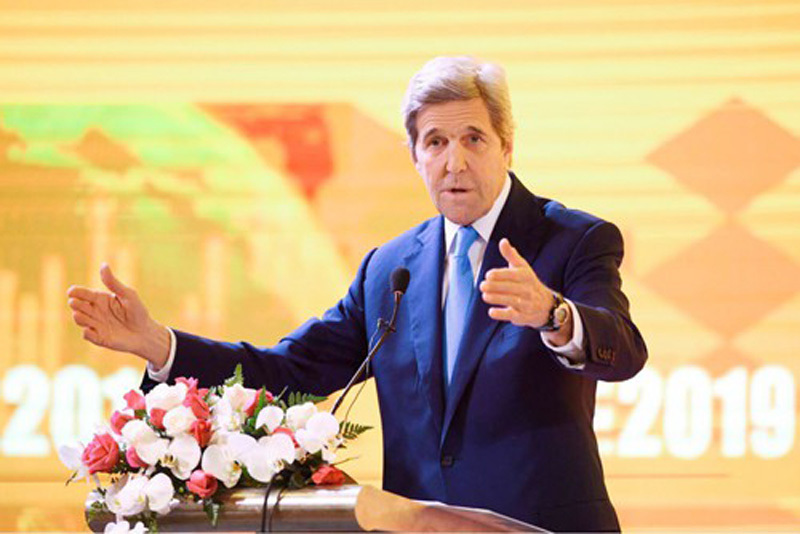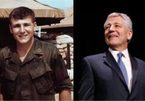In order to heal bilateral relationships, it is impossible to forget dealing with the aftermath of the war, including the Agent Orange matter, in which you played an active role. In your opinion, Mr. Chuck Hagel, what is the progress that the two countries have made?
Mr. Chuck Hagel: I was involved in this issue for many years when I was appointed Deputy Administrator of the Veterans Administration during the first term of President Ronald Reagan in 1981.
This is not only about the health of American veterans, but also what happened in Vietnam and the consequences caused by Agent Orange that the Vietnamese suffer.
 |
|
Former US Defense Secretary Chuck Hagel
|
I had a big disagreement with the Director at the time because they refused to fund further Agent Orange studies, so I resigned. Then I became the chair of the Agent Orange Payment Program. It was in the early 1980s and it was the largest out-of-court settlement of any business in the United States. Six factories producing Agent Orange agreed to pay $250 million for the creation of an account to help the victims and their families.
In my position as Secretary of Defense, I pushed to resolve this issue. However, we still have a lot to do. But I am very proud of how the American side has finally realized the serious consequences and damage that Agent Orange has caused for both the American soldiers and the Vietnamese people.
Vietnam ensures regional balance
For the two countries to have the relationships that they have now, it is thanks to the merits of many senators from previous generations. Mr. John Kerry, do we need younger politicians who understand and can develop relations between the two countries?
Mr. John Kerry: We really need this. Vietnam today has a very important role in the region. It is true that there are current tensions in the South China Sea (Vietnam calls the East Sea) between countries and China. But there are also greater strategic interests in the region where Vietnam can fully play a role in ensuring the balance of power.
 |
|
Former US Secretary of State John Kerry
|
I am pleased to see Secretary of State Mike Pompeo making strong comments on the South China Sea issue. Vietnam and the United States have been cooperating in ways we never imagined before. And obviously in commerce, we have the opportunity to make some very important moves later on.
America doesn't want to dominate, but we won't let anyone else do it. We want countries to be respected for their independence. Nations need the freedom to develop their economies and do what they want without fear of oppression or bullying. The important thing, in my opinion, is that we must understand the general rules.
In your opinion, what is the role of Vietnam in the current US-China relationship, and how to balance it?
Mr. John Kerry: Tensions are constant in the region, and the borders need to be carefully delimited. The US vision in this regard is it wants all parties to work together, from there to find ways to strengthen relations in the region.
This, in my opinion, requires economic, political, cultural and diplomatic cooperation and also mutual respect and cooperation in peace to eliminate differences, not any other unilateral action.
Surely we have many ways to do that. Whether the problem can be solved has nothing to do with whether we are right, but on whether we are ready to be reasonable.
Militarization of the South China Sea is a thoughtless act
China has illegally built artificial islands, and militarized islands in the Spratly Islands. What impact do you think this has on the world, Mr. Kerry?
Mr. John Kerry: This is very negative. I think the militarization of the islands in the South China Sea is a thoughtless act.
Although this is an act with the ambition to assert sovereignty claims in the South China Sea, I assure you, we will never recognize it. We will continue to maintain freedom of navigation exercises.
And Mr. Hagel, what do you think about it?
Mr. Chuck Hagel: The US-China relationship is different from the relationship with Vietnam and it is also like the difference between the Vietnam-US relationship and relations with China. But we also have US-Vietnam-China relations, as well as relations with Asian countries, countries in the South China Sea, trade links, and all that is happening in the Asia-Pacific region.
It is best for countries to come together to recognize the bilateral relationship between countries, and at the same time consider how they can be reconciled in a broader context. In my opinion, trade is the factor that helps countries do that. Of course, commerce is only one side, it is not a solution for all.
Freedom of navigation is also extremely important, or the respect for each nation, respect for the rights of each nation and its affairs. With diplomatic tools, we can handle this, not through the army, the navy, the air force or any other force against each other.
 |
|
Mr. John Kerry and Mr. Chuck Hagel
|
Respect differences
Mr. Hagel, what are the obstacles that can damage the bilateral relationship between Vietnam and the United States now and in the future?
Mr. Chuck Hagel: I think whenever you cooperate with a country, you need to understand their interests, their concerns so that you don't turn those differences into obstacles. What you need to do is to take action and resolve differences.
A government, a country cannot impose its own thinking and its type of government on other countries. The people of each country have their own opinion. Vietnamese people have a different opinion, so do Americans. So, with diplomatic tools, I think it helps to reconcile differences so as not to turn it into an obstacle to relations between countries. You must respect the difference and accept it.
To define the future of the two countries, what would you say and how would you act?
Mr. John Kerry: 'Together we will conquer the future.' I chose this because no country can do this on its own. There is no way to solve the world's problems except by cooperating and helping each other.
Between our two countries, there was the war long ago. But as Minister of Foreign Affairs Nguyen Co Thach, Ambassador Le Bang and many others have said that Vietnam needs to be seen as a country, not as the name of a war.
Currently, more and more Americans are coming to Vietnam and vice versa. A lot of goods from Vietnam are imported to the US. Educational collaboration also became notable with the Fulbright program.
The relationship in education of the two countries not only takes place in the US, where there are many Vietnamese students, but also takes place in Vietnam, where Vietnamese students can access an American education at home at American universities and be taught by native American teachers. This is really holding us together.
Mr. Chuck Hagel: I would choose the phrase "Do the right thing."
For development, I think it is advisable to continue to promote areas where the two countries work together, joint projects, cooperation for the common benefit, expand trade, strengthen military ship visits, joint drills and expand cooperation in the field of diplomacy, educational exchanges between universities, Vietnamese students studying in the US and vice versa. In addition, we should have more people-to-people exchange programs, to increase understanding of the region and its importance.
Bui Chi Trung (Senior Lecturer at the Press and Communication Training Institute, National University of Social Sciences and Humanities) - Tran Quang Huy (Social media specialist)

Former US secretaries of Defense and State departments share their memories about Vietnam
Forty-five years after the war and 25 years after the normalization of Vietnam-US relations, two former US senators, Chuck Hagel (former US Secretary of Defense) and John Kerry (former US Secretary of State) have shared their memories about Vietnam.